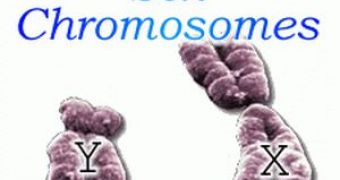In mammals, the sex determination is chromosomial. More specifically, all males carry two distinct types of sex chromosomes (XY) and females carry a pair of the same type, XX. Of course, this is also the case with the human species. But sometimes, extremely rare exceptions of XX men can appear.
This happens when a gene called SRY - situated on the Y chromosome - passes accidentally on the X chromosome inherited from the father. Other genes disrupt the sexual development of the embryo, leading to the so-called "hermaphrodite" children, neither fully male nor fully female. The XX men have functional testes, are infertile.
As always SRY is involved, it has long been called the 'maleness' gene. But recently, a team at University of Pavia in Italy has discovered that mutation in a specific gene also turns girls into boys. The finding advances - but also complicates - our understanding of how sex is determined by our genes.
The scientists found a family in which four brothers were each XX, but none carried the SRY gene. Instead, all bore a mutation in a gene called RSPO1. A crucial role in sexual development is played by a gene called SOX9, which in males is activated by SRY, causing testis and male development. Scientists suppose that, in female, SOX9 might be inhibited by RSPO1. Its arrested development leads to the development of ovaries. Mutant variant in those brothers RSPO1 failed to inhibit SOX9 and this led to male development.
Experiments led on mice showed that XX individuals with SOX9 unsuppressed developed on males. Previous theories said that female development was the result of the lack of maleness genes. "What is really important is that suppression of male and induction of female development is an active process," says Andreas Schedl of INSERM, the French National Institute of Health and Medical Research in Nice. "RSPO1 clearly plays a key role in this process."
RSPO1 encodes a multitasker protein involved the sex-determining pathway, but also caused all the males in that family to suffer from a cancer predisposing skin-thickening condition.
Now scientists want to see what happens with the mice when RSOP1 gene is missing.

 14 DAY TRIAL //
14 DAY TRIAL //